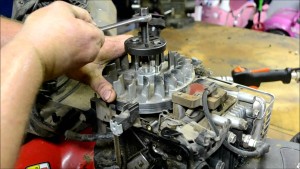 Here are some ideas, suggestions, and helpful hints about your outdoor power equipment:
Here are some ideas, suggestions, and helpful hints about your outdoor power equipment:
When calling about parts, repair, or service, always have your equipment’s Make, Model, and Serial Number! Though the equipment often has these numbers in hard to spot locations, they will be on the equipment somewhere! Keep looking until you find it! Then have it with you when you visit or call us. *(barring someone having vandalized, painted over, or abused the equipment.)
Why? Odd as it might seem, unlike with some automobile parts, lawn and garden equipment is highly diverse, specialized, minutely unique, and parts specific, making most purchases of parts absolutely dependent upon knowing the Make, Model, and Serial Numbers! This especially includes belts, but again, even most unit parts. Speaking of belts, while it’s tempting to try to interchange an automotive belt, we don’t recommend it
SMALL ENGINES DO NOT LIKE “ETHANOL”
We are seeing more and more gas-powered units coming to our shop with water in the fuel. This may be due to the 10 percent ethanol that has been added to our gasoline. Ethanol condenses in the fuel tanks/fuel can, adding water to the fuel supply. Peter Sawchuk, of Consumer Reports, says, “Combined ethanol and water can corrode the fuel delivery system, predominately the carburetor. It clogs it up and it can’t start.”
Toro’s link regarding Ethanol and fuels:
https://www.toro.com/fuelfacts/
Honda Power Equipment link regarding Ethanol and fuels:
http://powerequipment.honda.com/support/fuel-recommendations
Briggs & Stratton link regarding Ethanol and fuels:
https://www.briggsandstratton.com/us/en/support/faqs/fuel-recommendations
Stihl USA link regarding Ethanol and fuels:
http://www.stihlusa.com/WebContent/CMSFileLibrary/Gasoline_Guidelines-1.pdf
Consumer Reports link regarding Ethanol and fuels:
http://www.consumerreports.org/cro/news/2013/03/gas-with-ethanol-can-make-small-engines-fail/index.htm
We suggest that equipment owners CHANGE THE WAY THEY ARE HANDLING THEIR FUEL SUPPLIES. Try to buy fuel without ethanol. Read the ethanol information posted on the gas pump. NEVER use fuel with more than 10% ethanol in your small engines.
- Keep high quality (i.e. Startron or Ethanol Shield) fuel stabilizer in your fuel supplies. Stabil Marine for boats may also be used.
- When you FINISH your project, TOP OFF the fuel in your tank for storage. Never leave a small amount of fuel in your fuel tank. This invites condensation. For winter storage install fuel stabilizer in the tank and run the engine to get the fuel into the carburetor. Store the tank full or dry, NEVER half full.
- Discard non-stabilized gas that is more than 4 weeks old – both ethanol and non-ethanol. NEVER use gas from last year (stabilized or not).
- Keep fuel cans sealed. Never leave caps off and vents open.
- Do not add new gas to old gas in the can.
- DO NOT use METAL gas cans due to rust problems.
- And of course,
- DO NOT put DIESEL in your small engines.
- Avoid leaving equipment in the snow, rain or under sprinklers.
Tires
While it may be tempting to put an auto-seal tire sealant in a flat lawnmower tire, we can’t recommend it. Why? Because it typically just won’t work! But more so because it is corrosive over time and will rust your wheels, creating more troubles and expense down the road. Let our experienced service techs put a replacement tube in your tire instead. [the reason tire sealants seldom work is because of the lower air pressures used in lawn equipment compared to automobiles]
